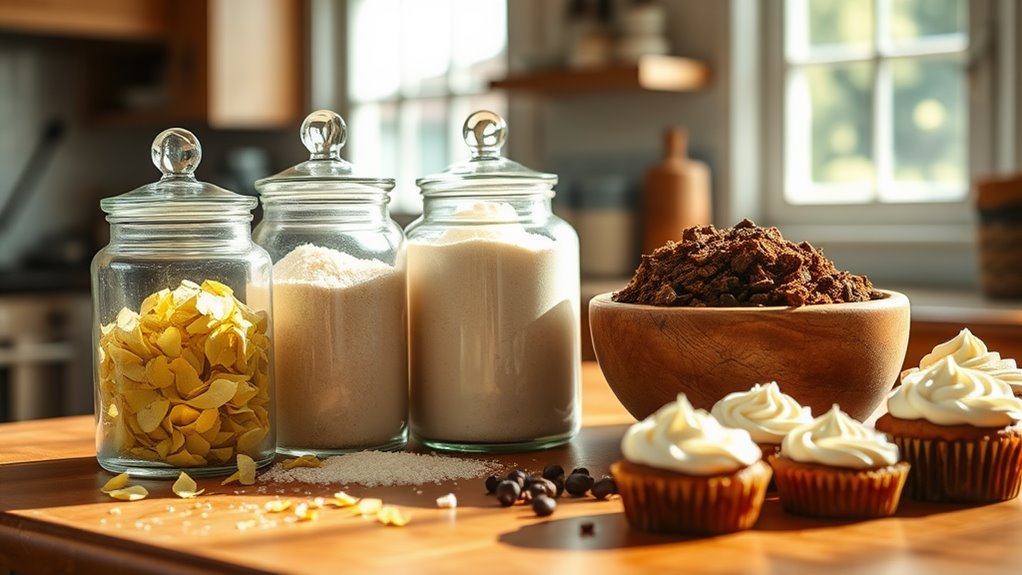When you're baking guilt-free, consider using sugar substitutes like stevia, erythritol, honey, maple syrup, and coconut sugar. Stevia is calorie-free and has a slightly herbal taste. Erythritol is low-calorie and easy to digest, making it perfect for low-carb diets. Honey adds moisture and boasts antioxidants, while maple syrup brings unique flavor and essential minerals. Coconut sugar offers a lower glycemic index and enhances flavors. These alternatives allow you to enjoy sweet treats without the sugar rush. Want to discover tips and tricks for baking with these substitutes? There's plenty more to explore!
Key Takeaways
- Stevia: A zero-calorie sweetener from the Stevia rebaudiana plant, offering a sweet, herbaceous flavor for guilt-free baking.
- Erythritol: A low-calorie sugar alcohol with 0.24 calories per gram, ideal for keto diets and easier on digestion.
- Honey: A natural sweetener rich in antioxidants, which adds moisture to baked goods and has a lower glycemic index than refined sugar.
- Maple Syrup: Packed with antioxidants and essential minerals, this flavorful alternative has a lower glycemic index than traditional sugars.
- Coconut Sugar: Derived from coconut palms, it has a lower glycemic index and contains trace minerals, enhancing health and flavor in recipes.
Stevia: A Natural Sweetener
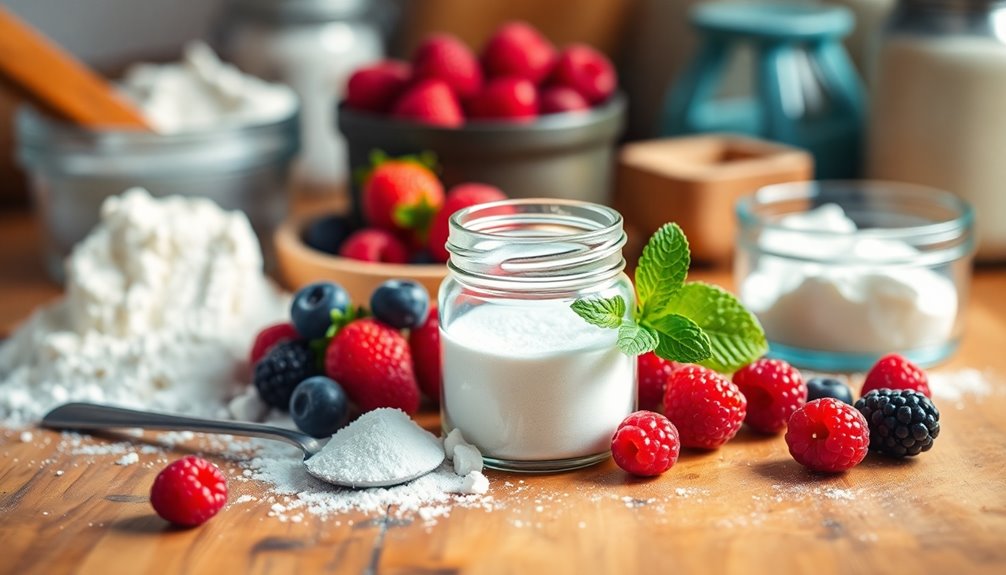
Exploring sugar substitutes can lead you to stevia, a natural sweetener derived from the leaves of the Stevia rebaudiana plant. This plant-based option has gained popularity for its impressive benefits.
First off, stevia contains zero calories, making it an appealing choice if you're looking to reduce sugar intake without sacrificing sweetness. Its taste is often described as sweet and slightly herbaceous, offering a unique flavor that can enhance your baking.
When it comes to using stevia in your recipes, there are a few essential baking tips to bear in mind. Since stevia is much sweeter than sugar, you'll need less of it. Typically, a teaspoon of stevia can replace a cup of sugar, but always check specific product guidelines. Additionally, stevia doesn't caramelize like sugar, so it works best in recipes where browning isn't crucial, such as cakes and muffins.
You might also want to experiment with recipes designed specifically for stevia to guarantee the best flavor and texture. Many resources offer delicious stevia recipes that can inspire you to create guilt-free treats. From cookies to smoothies, stevia can seamlessly fit into your culinary repertoire without compromising your health goals.
Moreover, using stevia as a sugar substitute can help mitigate the negative effects of traditional bread that contribute to weight gain and cravings. Embracing stevia not only aligns with a healthier lifestyle but can also nurture a sense of community as you share your newfound baking adventures with friends and family. Enjoy the journey of sweetening your life with this natural alternative!
Erythritol: Low-Calorie Option
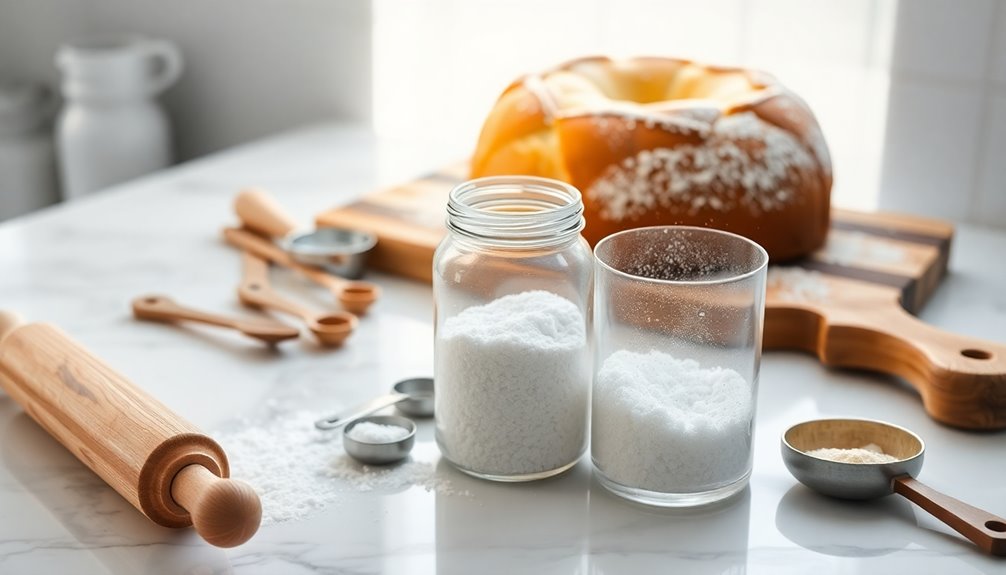
If you're searching for another sugar substitute to explore, erythritol is a low-calorie option that's gained traction among health-conscious bakers. This sugar alcohol contains only 0.24 calories per gram, making it an appealing choice for those looking to reduce their caloric intake without sacrificing sweetness. Plus, erythritol has some notable digestive benefits, as it's easier for your body to process compared to other sugar alcohols, often leading to less bloating and gas. Additionally, incorporating erythritol into your baking can align well with the Keto diet, making it a great choice for those following low-carb lifestyles.
When using erythritol in your baking, here are some helpful baking tips to guarantee the best results:
- Use a 1:1 ratio: Erythritol can often be used as a direct substitute for sugar, making it easy to swap in recipes.
- Combine with other sweeteners: Sometimes blending erythritol with other sweeteners, like stevia, can enhance the flavor and sweetness profile.
- Mind the texture: Erythritol can create a slightly gritty texture, so consider using powdered erythritol for smoother recipes.
- Watch the cooling effect: Erythritol has a cooling sensation in your mouth, which may not suit every recipe, so be mindful of this when baking.
- Adjust baking times: Erythritol can sometimes lead to longer baking times, so keep an eye on your treats as they bake.
Incorporating erythritol into your baking repertoire can help you enjoy delicious treats while staying mindful of your health goals.
Honey: Nature's Sweet Gift
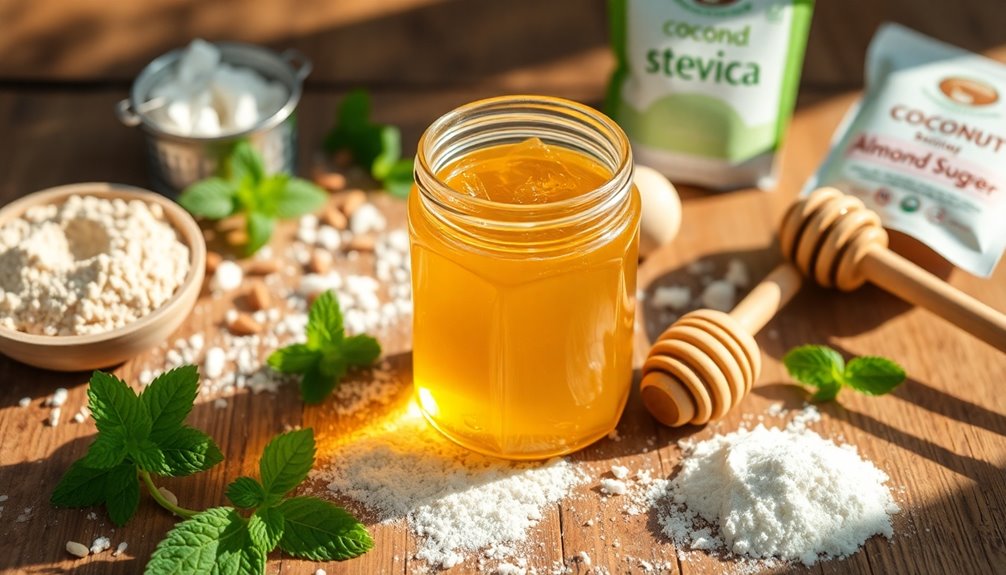
When it comes to sweetening your baked goods, honey stands out as nature's sweet gift, offering both flavor and health benefits. This golden liquid isn't just a delicious alternative to sugar; it also brings a range of honey benefits that can enhance your baking experience. It's rich in antioxidants and has anti-inflammatory properties, which can contribute to overall well-being.
Using honey in your recipes can also add moisture, making your cakes and muffins delightfully tender. Unlike refined sugars, honey has a lower glycemic index, meaning it can lead to a slower rise in blood sugar levels, which is great for those looking to manage their sugar intake. Plus, its unique flavor profile can elevate everyday treats.
You might want to explore various honey recipes that incorporate this natural sweetener. For instance, consider using honey in banana bread or oatmeal cookies for a touch of warmth and depth.
When substituting honey for sugar, remember that it's sweeter, so you'll need less—about ¾ cup of honey for every cup of sugar.
Don't forget to reduce the liquid in your recipe slightly, as honey adds moisture. Additionally, incorporating honey into your diet can complement a plant-based diet that offers significant health benefits. Whether you're baking for yourself or sharing with friends, honey can help you create guilt-free indulgences that everyone will love.
Maple Syrup: Flavorful Alternative
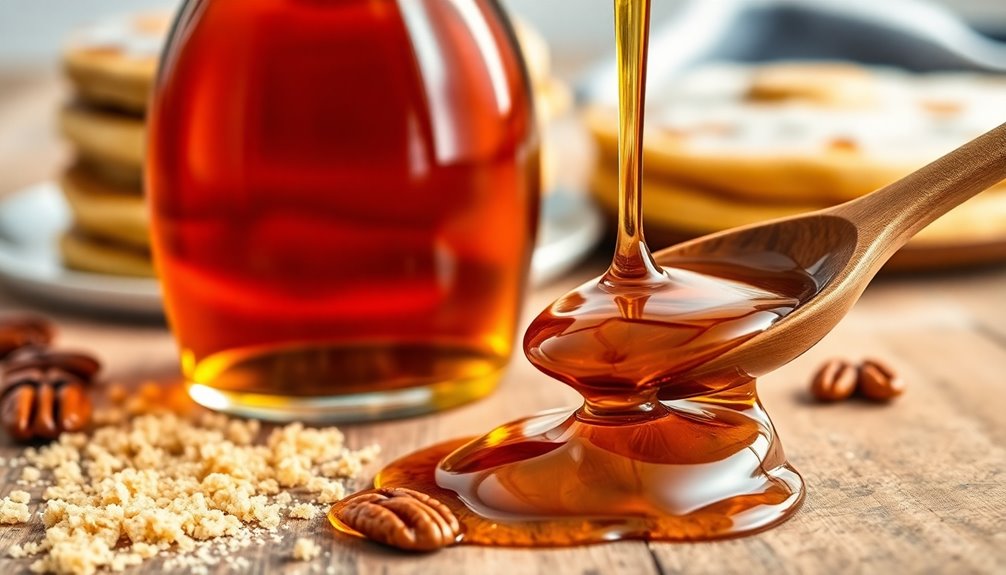
Maple syrup is a flavorful alternative to refined sugars that can elevate your baking game. Not only does it add a unique depth of flavor, but it also comes with several health benefits. When you're looking for a natural sweetener, maple syrup is a great choice that can enhance your favorite recipes.
Here are some maple syrup benefits that make it a standout option:
- Antioxidants: Maple syrup contains antioxidants that help fight inflammation and protect your cells.
- Lower Glycemic Index: It has a lower glycemic index than refined sugar, meaning it won't spike your blood sugar levels as quickly.
- Mineral-Rich: Maple syrup is packed with essential minerals like manganese and zinc, which support overall health.
- Flavor Variety: Its rich, caramel-like flavor can elevate everything from pancakes to baked goods.
- Versatile Use: You can easily substitute it in various maple syrup recipes, making it a flexible ingredient in your kitchen.
When you're baking with maple syrup, consider reducing any liquid in the recipe slightly to maintain the right consistency. Additionally, its health benefits have been supported by research from Garvan Institute of Medical Research, making it a reliable choice for those looking to manage their sugar intake. You'll find that it works beautifully in cookies, cakes, and even granola bars.
Coconut Sugar: A Healthier Choice
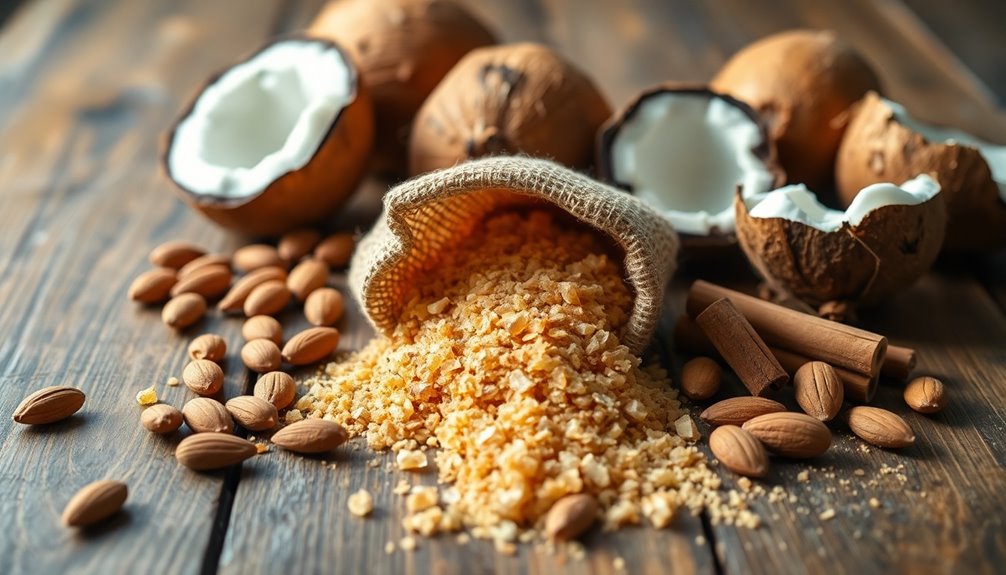
Coconut sugar offers another guilt-free option for those looking to sweeten their baked goods without the drawbacks of refined sugars. Derived from the sap of coconut palms, this natural sweetener not only tastes great but also boasts several health benefits. It has a lower glycemic index than regular sugar, which means it can help manage your blood sugar levels better. Plus, it contains trace minerals like potassium and magnesium, making it a more nutritious choice. Additionally, using coconut sugar in your baking can help improve your overall health and vitality, similar to how drinking from SlimCrystal bottles can boost energy levels.
When you bake with coconut sugar, keep in mind a few baking tips to get the best results:
| Baking Tip | Explanation |
|---|---|
| Use less than regular sugar | Coconut sugar is sweeter, so reduce the amount by about 25%. |
| Mix thoroughly | Its grainy texture requires good mixing for even sweetness. |
| Adjust baking time | Coconut sugar can brown faster; check on your treats sooner. |
| Experiment with flavors | It has a slight caramel undertone, enhancing recipes like brownies and cookies.
Frequently Asked Questions
Can Sugar Substitutes Affect the Texture of Baked Goods?
Yes, sugar substitutes can definitely affect the texture of your baked goods. When you swap sugar, it can alter the baking consistency, leading to denser or drier results. Some substitutes may not caramelize like sugar, impacting the final texture.
Additionally, they can change flavor profiles, sometimes resulting in an aftertaste that sugar doesn't have. Experimenting with different substitutes helps you understand how they interact with your favorite recipes, ensuring you get the results you want.
Are Sugar Substitutes Safe for Children to Consume?
Are sugar substitutes safe for children? Imagine giving your kids a tasty treat without the sugar rush!
While many substitutes can be safe, it's important to take health concerns into account. Some may cause digestive issues or allergic reactions.
Parental guidance is essential in choosing age-appropriate options, and moderation is key.
Always check labels and consult with a pediatrician to make sure you're making informed choices for your child's well-being. Your kids deserve the best!
How Do Sugar Substitutes Impact Blood Sugar Levels?
Sugar substitutes can greatly impact your blood sugar levels. They often have a lower glycemic index than regular sugar, making them a better choice for weight management. By using these substitutes, you can enjoy sweet flavors without causing spikes in your blood sugar.
Additionally, they're generally better for dental health, as they don't feed the bacteria that lead to cavities. It's a smart way to satisfy your sweet tooth while staying mindful of your health.
Can I Substitute Sugar in All Recipes?
Can you really substitute sugar in all recipes? While many baking alternatives exist, not every substitute works perfectly in every dish. Different sweeteners can alter flavor profiles and textures, so experimentation is crucial.
For instance, some substitutes might make your baked goods taste different or affect their rise. It's recommended to start with recipes specifically designed for alternatives, ensuring you still enjoy the delicious results you crave.
Do Sugar Substitutes Have a Shelf Life?
Yes, sugar substitutes do have a shelf life, just like regular sugar. To guarantee they last, you should store them properly, keeping them in a cool, dry place and tightly sealed.
Always check the expiration dates on the packaging, as these can vary between products. Using them past their expiration can affect flavor and texture.
Conclusion
Incorporating these sugar substitutes into your baking can feel like discovering a treasure trove of flavor and health benefits. Just as the mythical golden touch turned everything to gold, these alternatives can sweeten your treats without the guilt. With options like stevia and erythritol, you can enjoy delicious desserts while keeping calories in check. So, whether you're whipping up cookies or cakes, embrace these guilt-free choices and indulge in your baking adventures with confidence.

